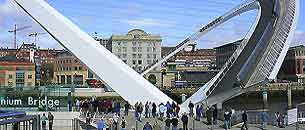University of Newcastle upon Tyne
University Information, Campus and History
(Newcastle upon Tyne, England)
The University of Newcastle upon Tyne is a public university located in Newcastle, United Kingdom. Its history dates back to 1834, the founding of a school of medicine and surgery in Newcastle, as well as 1871, when Armstrong College was founded. In 1937, these colleges merged to form King's Colleges and became the University of Newcastle upon Tyne in 1963.
Since 1945, the university has continually expanded to its modern university form today. The university was built on 45 acres of land around the buildings of Armstrong College. Since then, the university has built a medical school, dental school, sports hall, and the Robinson Library.
Today, the university is home to around 18,000 undergraduate and postgraduate students. There are around 1,500 international students studying in the university from 100 countries around the world. It was awarded University of the Year by the Sunday Times in 2000.
The university's academic structure was originally composed of seven faculties. Today, it has only three faculties, which are the following: the Faculty of Medical Sciences, the Faculty of Science, Agriculture, and Engineering, and the Faculty of Humanities, Arts, and Social Sciences. A pro-vice chancellor assisted by three other deans, heads of each of the three faculties.
Aside from reorganising its faculties, the university also restructured its 75 departments. The university originally had 75 departments but merged some of them to create 27 schools. These schools are known for their active research centres, institutes, and groups.
Facilities
The university is composed of several award-winning general and specialist libraries. Robinson Library is the university's main library and houses over 10,000 periodicals and a million books. This library can seat 2,000 students and contains 200 networked computers. This library contains a special collection of rare manuscripts, books, illustrations, and maps.
The university's specialist libraries cater to various fields of study such as English, History, Law, Geography, and Medicine. There is also a Research Beehive facility, which provides social, library and meeting rooms for students and staff.
Students and staff can also take advantage of the university's computing facilities. Here, students have access to networked computers so they can check the university's Blackboards which are supported by the university's intranet. These blackboards contain a course's learning materials, module information, and resources. The university also offers netskills training and knowledge support in Internet and information technology (IT). Other computing services offered include a virtual reality facility and data preparation service.
The university theatres, art galleries, and museums are open to the public. Some of these facilities include the Hancock Museum, the Museum of Antiquities, the Hatton Gallery, the Shefton Museum of Greek Art and Archaeology, and the Playhouse Theatre and Gulbenkian Studio. These facilities offer students, staff, and the general public regular art exhibitions, art collections, archaeological artefacts and student productions.
Photography enthusiasts can also take advantage of the university's photography and video facilities. These are the BALTIC Centre for Contemporary Art and the Hatton Gallery, which both have dark rooms and venues. They can be booked by both researchers and students.
For students interested in learning other languages or honing their English skills, the university has several language facilities to train students by way of consecutive and simultaneous interpretation, analysis, and transcription of tape recordings, and foreign languages.
The environmental, agricultural, and biological sciences have constructed several field stations, farms, and gardens to accommodate more of their research and teaching activities. Some of these facilities include the Close House Biology Field Station, Dove Marine Laboratory, Cockle Park Farm, Mine Site Research Facility, Nafferton Farm, Moorbank Botanical Gardens, Palace Leas Plots and Research Vessel Bernicia.
The medical sciences faculty has its own laboratories and medical facilities for its teaching and research needs. Music facilities in the university include an audio library, the Mackie Recording Studio, Hopkins Recording Studio, Sony Recording Studio, and the Sage Gateshead.
For students who have difficulty adjusting to university life and academic demands, the university offers counselling services, tutorial aides and advice centres. Here, professional counsellors and psychologists talk with troubled students and help them solve or ease their burdens.
The university is ranked as one of the top 10 sport universities in the UK. This is because of its superb recreational and sport centres for golf, rowing, tennis, hockey, football, rugby, lacrosse, cricket, netball, and swimming.
Famous Students
Over the years, the university has produced successful graduates in various fields. Some of the university's famous students include Electrical Engineering graduate-turned-actor Rowan Atkinson, journalist Kate Adie, television presenter Debbie King, and musicians Bryan Ferry and Paul Tucker. Politician Bruce Edward Babbitt, Olympic gold medallist Ed Coode, and Australian Minister Alexander John Gosse Downer are also products of the university.
Interested international students can direct their queries through the university's International Office. Phone them at +44 (0) 191 222 5594 or send them a fax at +44 (0) 191 222 8685. The university has an excellent support team ready to answer your queries about admission requirements, course offerings, university facilities, student accommodation, Landlord insurance, and travel tips.
Interested international students can direct their queries through the university's International Office. Phone them at +44 (0) 191 222 5594 or send them a fax at +44 (0) 191 222 8685. The university has an excellent support team ready to answer your queries about admission requirements, course offerings, university facilities, student accommodation, Landlord insurance, and travel tips.
| Contact
University of Newcastle upon Tyne: |
Address: Enquiries Service, 10 Kensington Terrace, University of Newcastle upon Tyne, Newcastle upon Tyne, NE1 7RU, Engand, UK
|
Tel: +44 (0)191 222 6000
Fax: +44 (0)191 222 8685
Email: use website enquiry form
Website:
http://www.ncl.ac.uk |
 |
